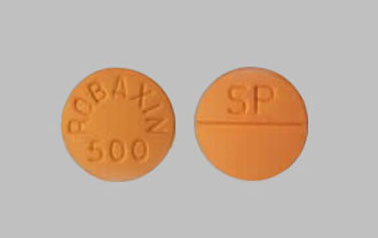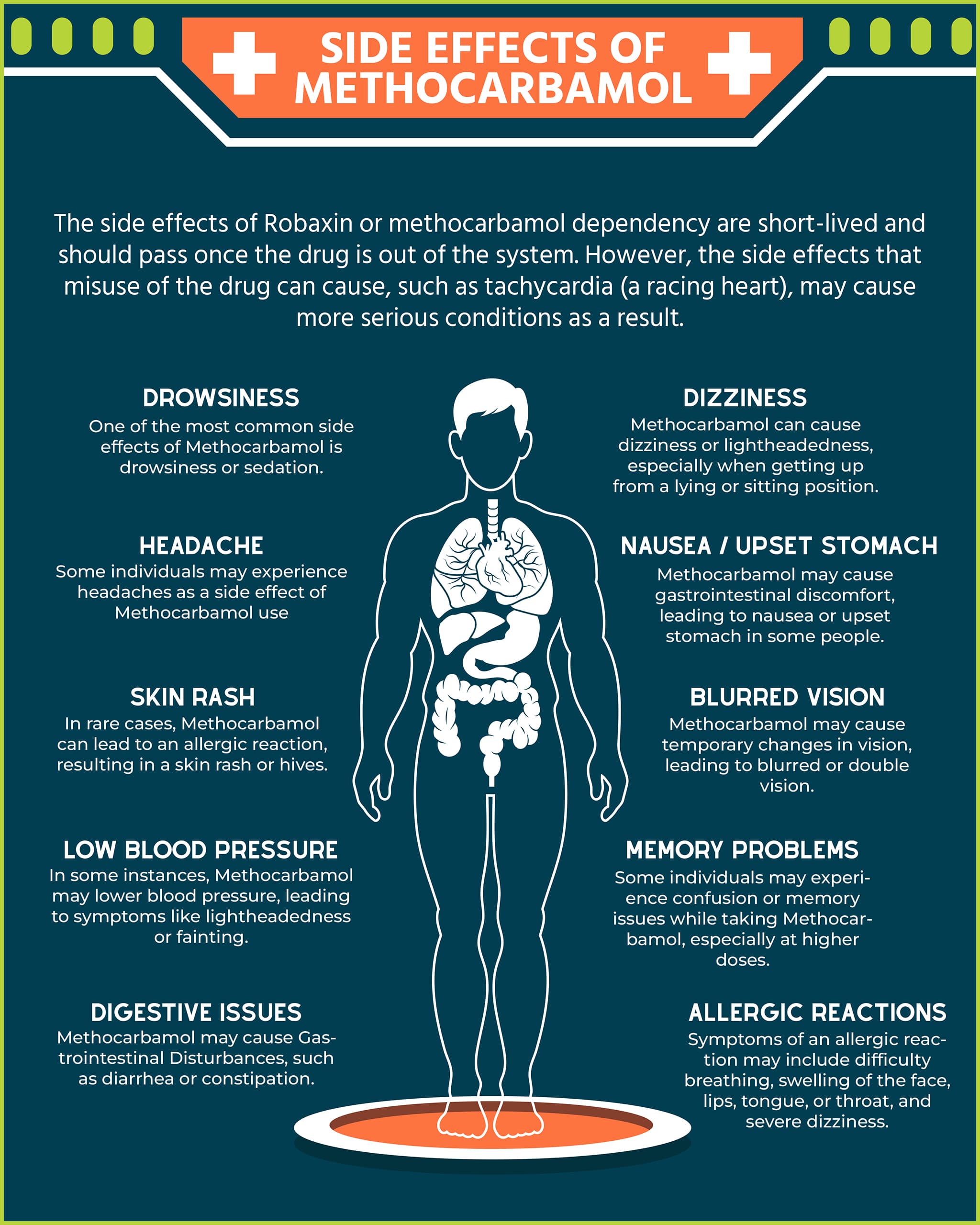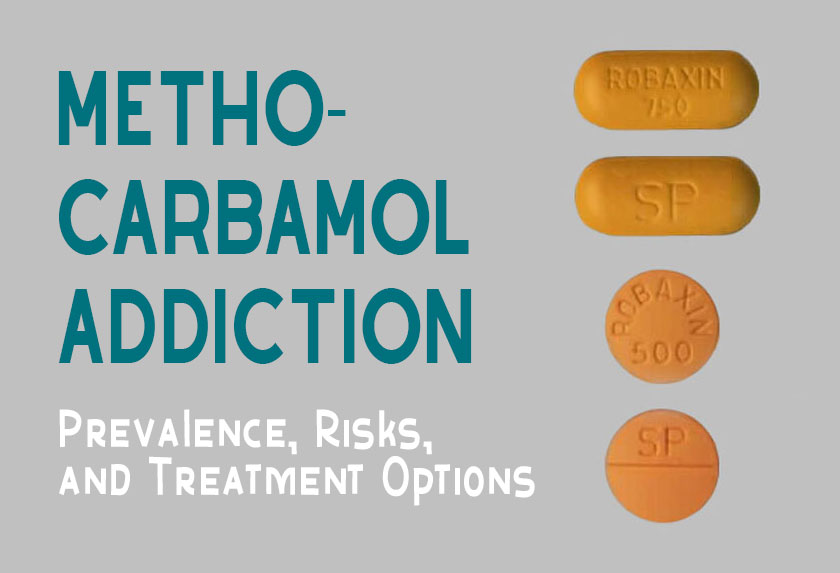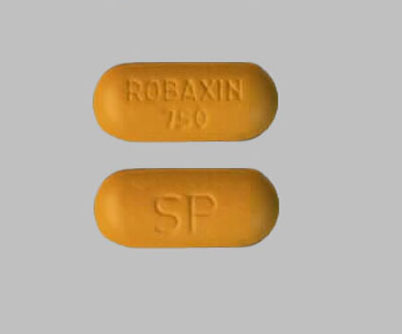While methocarbamol addiction is rare, the dependency behaviors it creates can make a person vulnerable to future substance misuse and abuse.
According to the National Institute on Drug Abuse (NIDA), it is estimated that over 1 million people in the United States abuse methocarbamol each year.
Methocarbamol is a Schedule IV controlled substance, which means that it has a low potential for abuse but can still be addictive.
The risk of methocarbamol addiction is higher in people who have a history of substance abuse or who take the drug for longer periods of time.
Dependency on this muscle relaxant often occurs because the prescribed dose no longer feels effective for the person taking it. To counter this, risky behaviors, such as taking more than the prescribed dose, often develop.
What Is Methocarbamol?
Methocarbamol, commonly known by its brand name Robaxin, is a muscle relaxant used to relieve muscle pain and discomfort caused by injuries or muscle spasms.
The drug works by disrupting the pain receptors in the brain, which can also reduce muscle spasms. Pain is reduced due to fewer or less severe muscle spasms, and also by blocking the pain signals that are normally sent to the brain.
Dependency rates to methocarbamol are typically low, especially compared to similar drugs such as lorazepam. However, addiction is possible, and if it occurs, it usually requires specialized treatment.
For this reason, it is always recommended to only take this medication as prescribed by a doctor and to never increase the dosage or use it recreationally.
Methocarbamol 500 mg
Methocarbamol 500 mg is a specific dosage of the medication Methocarbamol. It is available in various strengths, with 500 mg being a common dosage strength.
When Methocarbamol is prescribed at a dosage of 500 mg, it means each tablet or capsule contains 500 milligrams of the active ingredient, Methocarbamol.
The dosage and frequency of Methocarbamol intake can vary based on the severity of the condition and individual patient factors. It is essential to follow the exact dosing instructions provided by the prescribing healthcare professional to ensure safe and effective use of the medication.

Statistics on Methocarbamol Addiction
- Prevalence of Methocarbamol Addiction: Studies indicate that the prevalence of Robaxin addiction is relatively low compared to other drugs with higher abuse potential. However, it is essential to note that even a low prevalence can have severe consequences for affected individuals.
- Co-Occurrence with Other Substances: Research shows that individuals with a history of substance misuse tendencies may be more susceptible to developing a dependency on Robaxin. Approximately 30% of individuals with a prior substance use disorder have an increased risk of developing dependency on prescription medications, including muscle relaxants like Robaxin.
Signs of Methocarbamol Addiction
- You’re Dependent on Another Substance, Too
Addiction to methocarbamol is more likely if you already have an ongoing dependency with another substance, either medically or recreationally.
The addiction cycle in the case of Robaxin is driven more by dependent behaviors than the addictive qualities of the drug itself. If you already have, or have previously had, substance misuse tendencies, the behavior patterns can create a dependency to methocarbamol despite its low addiction risk.
- You Take More Than Your Physician Prescribes
If you feel like your current dose doesn’t control your pain or muscle spasms, but your physician doesn’t increase your prescribed dose, do you take more pills anyway?
Robaxin misuse often happens when a person feels they need to take more of the drug than prescribed to maintain a level of control over their pain or muscle spasms.
- You Obsess About Your Next Dose
Do you plan your day around your medication times? Are you already thinking of when to have the next dose when you’ve just taken one?
You may feel like you’re not able to focus on your day until you’ve taken your dose, or that you experience anxiety if you can’t take methocarbamol at the exact time you planned to.
Obsessing over any medication and letting it control your daily routine is a sign of dependency.
- You No Longer Enjoy Activities or Hobbies
If you choose to reject activities, such as seeing friends, in favor of finding and taking Robaxin, this is a strong sign of dependency.
No longer having an interest in things you used to enjoy, and putting your need to have methocarbamol above other things, are both significant signs of dependency.
- Your Emotions Depend on Taking Methocarbamol
A common sign of dependency is relating your feelings to whether you’ve been able to take your chosen drug.
When you’re taking a higher dose than you’ve been prescribed, you’ll run out of your medication sooner than you should. When you need to get hold of more Robaxin, does that make you feel anxious?
Do you consider risky behaviors, such as buying an unseen drug online, to satisfy your need for it?
Taking risks, or feeling depressed when you have no access to methocarbamol, are both signs of dependency.
Side Effects of Methocarbamol

The side effects of Robaxin or methocarbamol dependency are short-lived and should pass once the drug is out of the system.
However, the side effects that misuse of the drug can cause, such as tachycardia (a racing heart), may cause more serious conditions as a result.
Here are some common side effects associated with Methocarbamol:
- Drowsiness: One of the most common side effects of Methocarbamol is drowsiness or sedation. This effect may impair your ability to operate machinery or engage in activities that require mental alertness.
- Dizziness: Methocarbamol can cause dizziness or lightheadedness, especially when getting up from a lying or sitting position. It’s essential to move slowly and be cautious to prevent falls or accidents.
- Headache: Some individuals may experience headaches as a side effect of Methocarbamol use.
- Nausea and Upset Stomach: Methocarbamol may cause gastrointestinal discomfort, leading to nausea or upset stomach in some people.
- Skin Rash: In rare cases, Methocarbamol can lead to an allergic reaction, resulting in a skin rash or hives. If you notice any skin changes after taking this medication, seek immediate medical attention.
- Blurred Vision: Methocarbamol may cause temporary changes in vision, leading to blurred or double vision.
- Low Blood Pressure: In some instances, Methocarbamol may lower blood pressure, leading to symptoms like lightheadedness or fainting.
- Confusion or Memory Problems: Some individuals may experience confusion or memory issues while taking Methocarbamol, especially at higher doses.
- Gastrointestinal Disturbances: Methocarbamol may cause digestive issues, such as diarrhea or constipation.
- Allergic Reactions: Although rare, severe allergic reactions to Methocarbamol can occur. Symptoms of an allergic reaction may include difficulty breathing, swelling of the face, lips, tongue, or throat, and severe dizziness. Seek immediate medical attention if you experience any signs of an allergic reaction.
It’s crucial to note that not everyone will experience these side effects, and some people may tolerate the medication well without any adverse reactions.
If you are prescribed Methocarbamol and are concerned about potential side effects, it’s essential to discuss your concerns with your healthcare provider, who can provide personalized guidance based on your medical history and individual needs.
Additionally, avoid alcohol and other medications that may interact with Methocarbamol without consulting your healthcare professional.
It’s important to seek medical help if you think you have a Robaxin dependency and it’s vital that you don’t stop taking it on your own.
Plan your withdrawal timeline with a medical professional to avoid the worst side effects and minimize risks associated with stopping the drug.
Treatment Options for Methocarbamol Addiction
- Inpatient Treatment: For individuals with severe dependency, inpatient treatment provides a structured environment with medical supervision to safely detox from methocarbamol. Therapists and counselors help address underlying behavioral patterns and develop coping strategies to avoid relapse.
- Outpatient Treatment: If appropriate, outpatient programs offer flexibility for treatment while maintaining daily responsibilities. Outpatient therapy sessions, conducted by experienced counselors, focus on behavioral changes and preventing relapse.
Improving Your Journey to Recovery
To maximize the effectiveness of your Robaxin addiction treatment and support, consider the following:
- Engage in support groups or forums where individuals share their experiences and recovery stories.
- Collaborate closely with healthcare professionals and counselors to tailor treatment plans to your specific needs.
Understanding the prevalence and risks of Methocarbamol addiction is crucial for promoting informed decision-making and timely intervention.
By recognizing signs of dependency and seeking appropriate treatment, individuals can embark on a successful journey to recovery and regain control of their lives.
Remember, seeking professional help is the first step towards a healthier, drug-free future.






